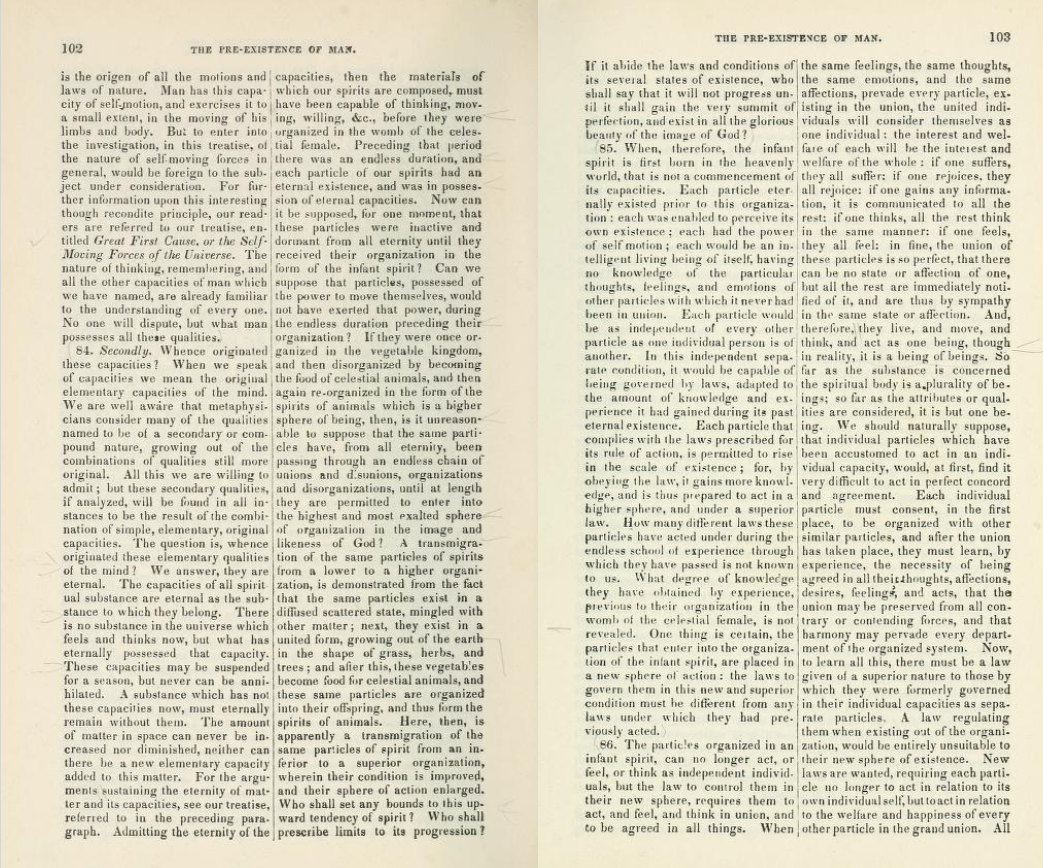Orson Pratt teaches that the birth of our spirits if not not the beginning of existence; each particle eternally existed prior to their organization and was self-conscious.
- Type
- Periodical
- Hearsay
- Direct
- Reference
Orson Pratt, "The Pre-Existence of Man," The Seer 1, no. 7 (July 1853): 102-3
- Scribe/Publisher
- The Seer
- Audience
- Reading Public
- Transcription
84. Secondly. Whence originated these capacities? When we speak of capacities we mean the original elementary capacities of the mind. We are well aware that metaphysicians consider many of the qualities named to be of a secondary or compound nature, growing out of the combinations of qualities still more original. All this we are willing to admit; but these secondary qualities, if analyzed, will be found in all instances to be the result of the combination of simple, elementary, original capacities. The question is, whence originated these elementary qualities of the mind? We answer, they are eternal. The capacities of all spiritual substance are eternal as the substance to which they belong. There is no substance in the universe which feels and thinks now, but what has eternally possessed that capacity. These capacities may be suspended for a season, but never can be annihilated. A substance which has not these capacities now, must eternally remain without them. The amount of matter in space can never be increased nor diminished, neither can there be a new elementary capacity added to this matter. For the arguments sustaining the eternity of matter and its capacities, see our treatise, referred to in the preceding paragraph. Admitting the eternity of the capacities, then the materials of which our spirits are composed, must have been capable of thinking, moving, willing, &c., before they were organized in the womb of the celestial female. Preceding that period there was an endless duration, and each particle of our spirits had an eternal existence, and was in possession of eternal capacities. Now can it be supposed, for one moment, that these particles were inactive and dormant from all eternity until they received their organization in the form of the infant spirit? Can we suppose that particles, possessed of the power to move themselves, would not have exerted that power, during the endless duration preceding their organization? If they were once organized in the vegetable kingdom, and then disorganized by becoming the food of celestial animals, and then again re-organized in the form of the spirits of animals which is a higher sphere of being, then, is it unreasonable to suppose that the seine particles have, from all eternity, been passing through an endless chain of unions and disunions, organizations and disorganizations, until at length they are permitted to enter into the highest and most exalted sphere of organization in the image and likeness of God? A transmigration of the same particles of spirits from a lower to a higher organization, is demonstrated from the fact that the same particles exist in a diffused scattered state, mingled with other matter; next, they exist in a united form, growing out of the earth in the shape of grass, herbs, and trees; and after this, these vegetables become food for celestial animals, and these same particles are organized into their offspring, and thus form the spirits of animals. Here, then, is apparently a transmigration of the same particles of spirit from an inferior to a superior organization, wherein their condition is improved, and their sphere of action enlarged. Who shall set any bounds to this upward tendency of spirit? Who shall prescribe limits to its progression? If it abide the laws and conditions of its several states of existence, who shall say that it will not progress until it shall gain the very summit of perfection, and exist in all the glorious beauty of the image of God?
85. When, therefore, the infant spirit is first born in the heavenly world, that is not a commencement of its capacities. Each particle eternally existed prior to this organization: each was enabled to perceive its own existence; each had the power of self-motion; each would be an intelligent living being of itself; having no knowledge of the particular thoughts, feelings, and emotions of other particles with which it never had been in union. Each particle would be as independent of every other particle as one individual person is of another. In this independent separate condition, it would be capable of being governed by laws, adapted to the amount of knowledge and experience it had gained during its past eternal existence. Each particle that complies with the laws prescribed for its rule of action, is permitted to rise in the scale of existence; for, by obeying the law, it gains more knowledge, and is thus prepared to act in a higher sphere, and under a superior law. How many different laws these particles have acted under during the endless school of experience through which they have passed is not known to us. What degree of knowledge they have obtained by experience, previous to their organization in the womb of the celestial female, is not revealed. One thing is certain, the particles that enter into the organization of the infant spirit, are placed in a new sphere of action: the laws to govern them in this new and superior condition must be different from any laws under which they had previously acted.
- Citations in Mormonr Qnas
The B. H. Roberts Foundation is not owned by, operated by, or affiliated with the Church of Jesus Christ of Latter-day Saints.

